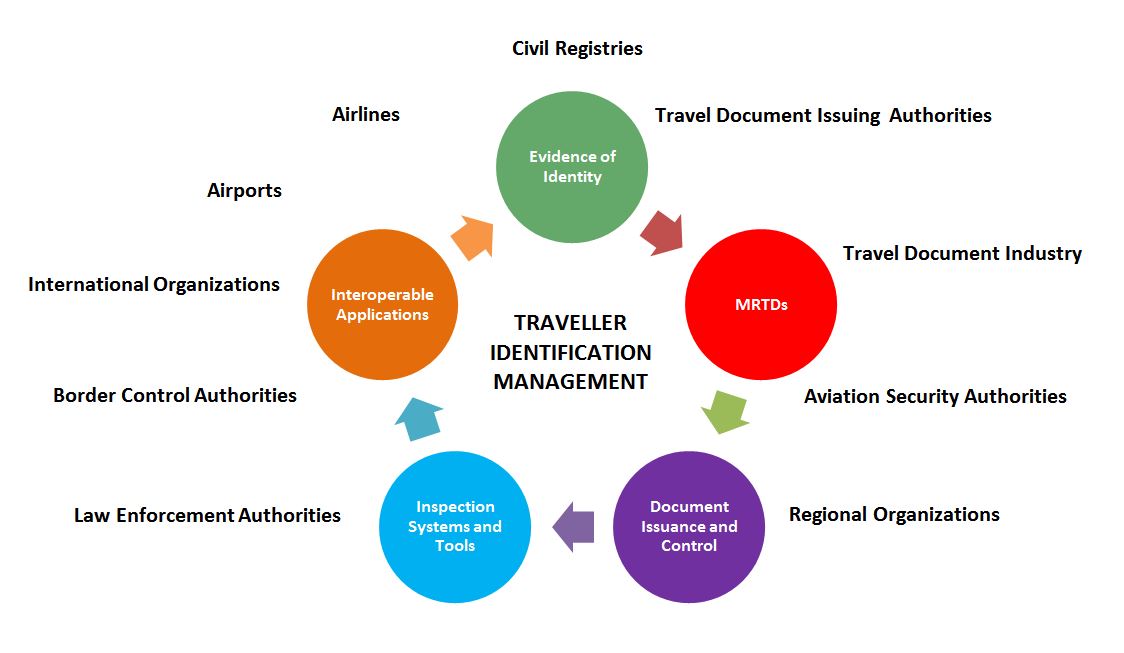ICAO TRIP
The MRTD field has been rapidly evolving into the broader global agenda of traveller identification management. At the 38th Session of ICAO Assembly (24 September – 4 October 2013), Member States adopted the ICAO Traveller Identification Programme (ICAO TRIP) Strategy, which aims to establish the goal and objectives of traveller identification management, to lead and reinforce a global approach, and to provide direction for action by ICAO, States and the many international, regional and industry partners in identification management. The ICAO TRIP Strategy presents a framework for multidimensional integrated efforts and synergies, under ICAO's leadership, to support ICAO's Strategic Objectives in the 2014-2016 triennium and beyond.
Five Key Elements
At the centre of the ICAO TRIP Strategy is the key proposition for States, ICAO and all stakeholders to address, individually and collectively: that a holistic, coherent, coordinated approach to the interdependent elements of traveller identification management is essential, encompassing the following elements:
- Evidence of identity – credible evidence of identity, involving the tracing, linkage and verification of identity against breeder documents to ensure the authenticity of identity;
- MRTDs – the design and manufacture of standardized MRTDs, including ePassports, that comply with ICAO specifications;
- Document issuance and control – processes and protocols for document issuance by appropriate authorities to authorized holders, and controls to prevent theft, tampering and loss;
- Inspection systems and tools – inspection systems and tools for the efficient and secure reading and verification of MRTDs, including use of the ICAO PKD; and
- Interoperable applications – globally interoperable applications and protocols that provide for timely, secure and reliable linkage of MRTDs and their holders to available and relevant data in the course of inspection operations.

Objectives
For ICAO and its Member States, the vision in traveller identification management is: all Member States can uniquely identify individuals. When the elements of identification management are optimally achieved, States will be in a position to identify individuals by their travel document with the highest possible degree of certainty, security and efficiency.
Recognizing the benefits of traveller identification management to aviation security and facilitation, and the vision that all Member States can uniquely identify individuals, ICAO's mission is to contribute to the capacity of Member States to uniquely identify individuals by providing appropriate authorities worldwide with the relevant supporting mechanisms to establish and confirm the identity of travellers. The ICAO TRIP Strategy also provides the basis for a detailed Business Plan to be developed, commensurate with resources available, and corresponding actions to be taken.
Travel documents are a matter of strategic importance for international civil aviation under the ICAO's Council approved Strategic Objective C – Security and Facilitation and Strategic Objective D – Economic Development of Air Transport. Since the beginning of the 1980s, ICAO's leadership and activities in travel documentation policy and operational matters have made a significant contribution towards the enhancement of aviation security and facilitation—notably through uniform and progressive development of travel document Standards and Recommended Practices (SARPs), guidance material and providing assistance to States in the implementation of effective and efficient travel document and border control systems.
Travel documents serve the broad transport sector by contributing to border integrity not only in air transport but also in maritime and land transport settings. These important benefits extend the contribution of ICAO travel document related activities beyond ensuring border integrity at international airports. The new Strategy provides significant enhancement for the future in both aviation security and facilitation by bringing together the elements of holistic identification management into an integrated result-oriented framework.
ICAO TRIP Strategy

